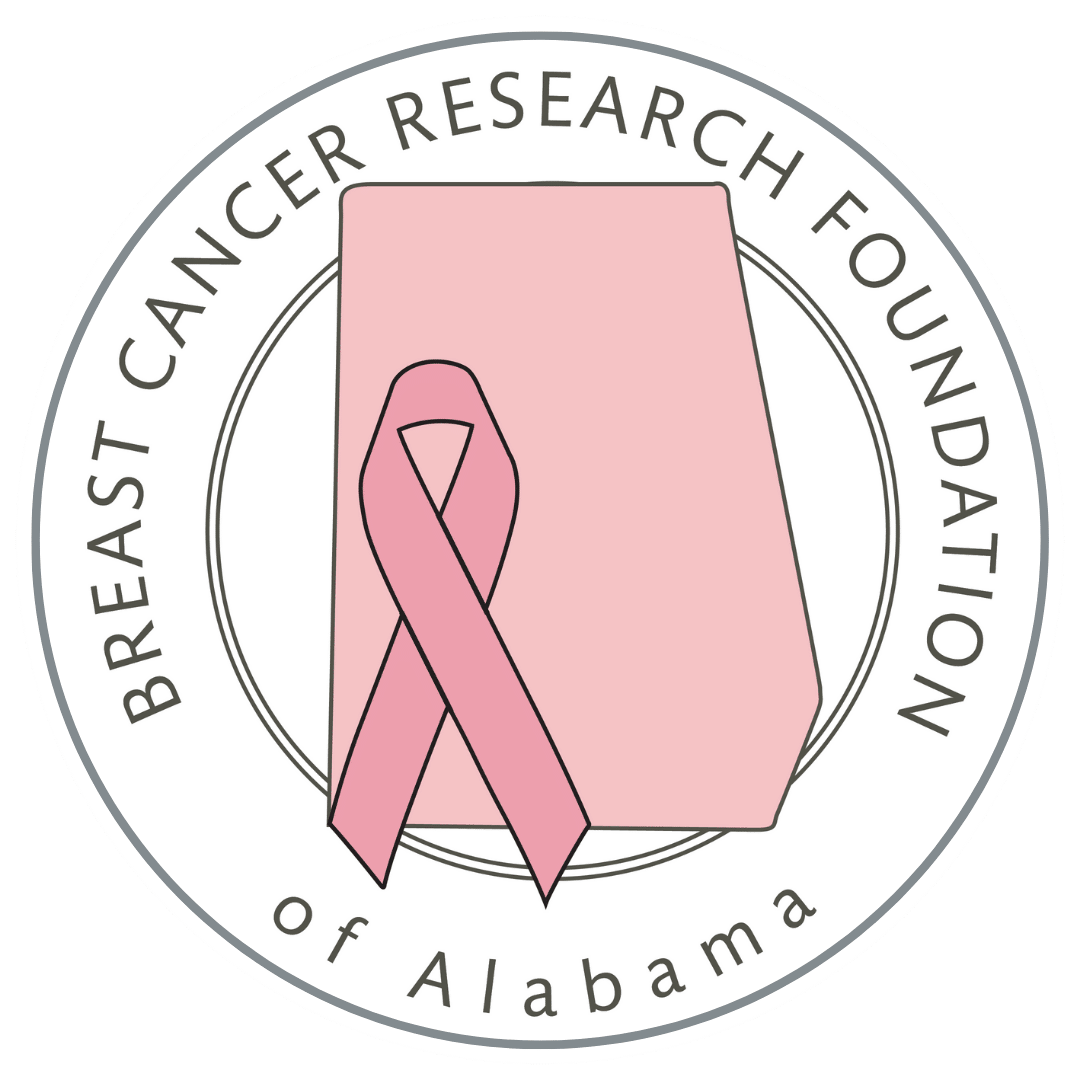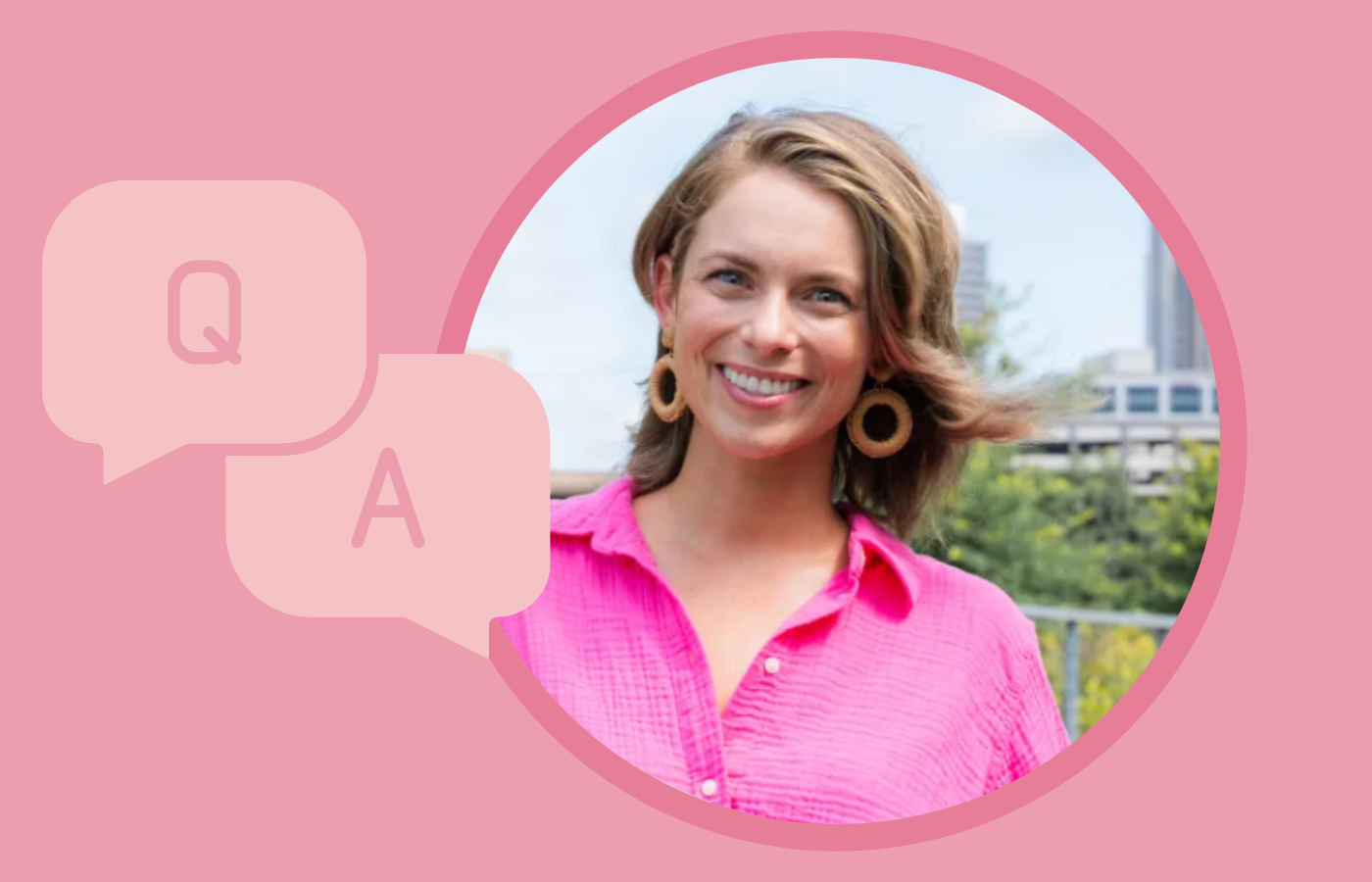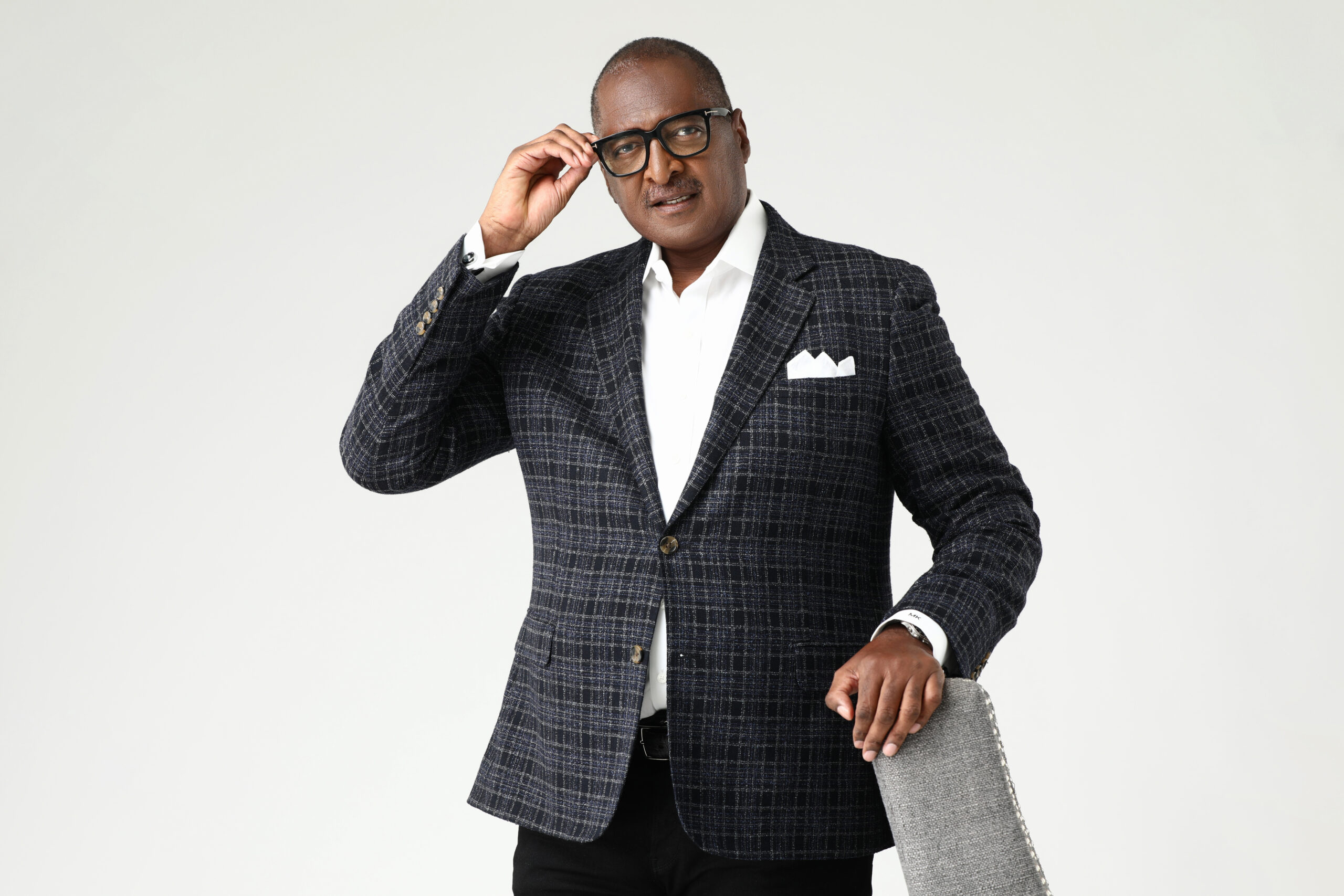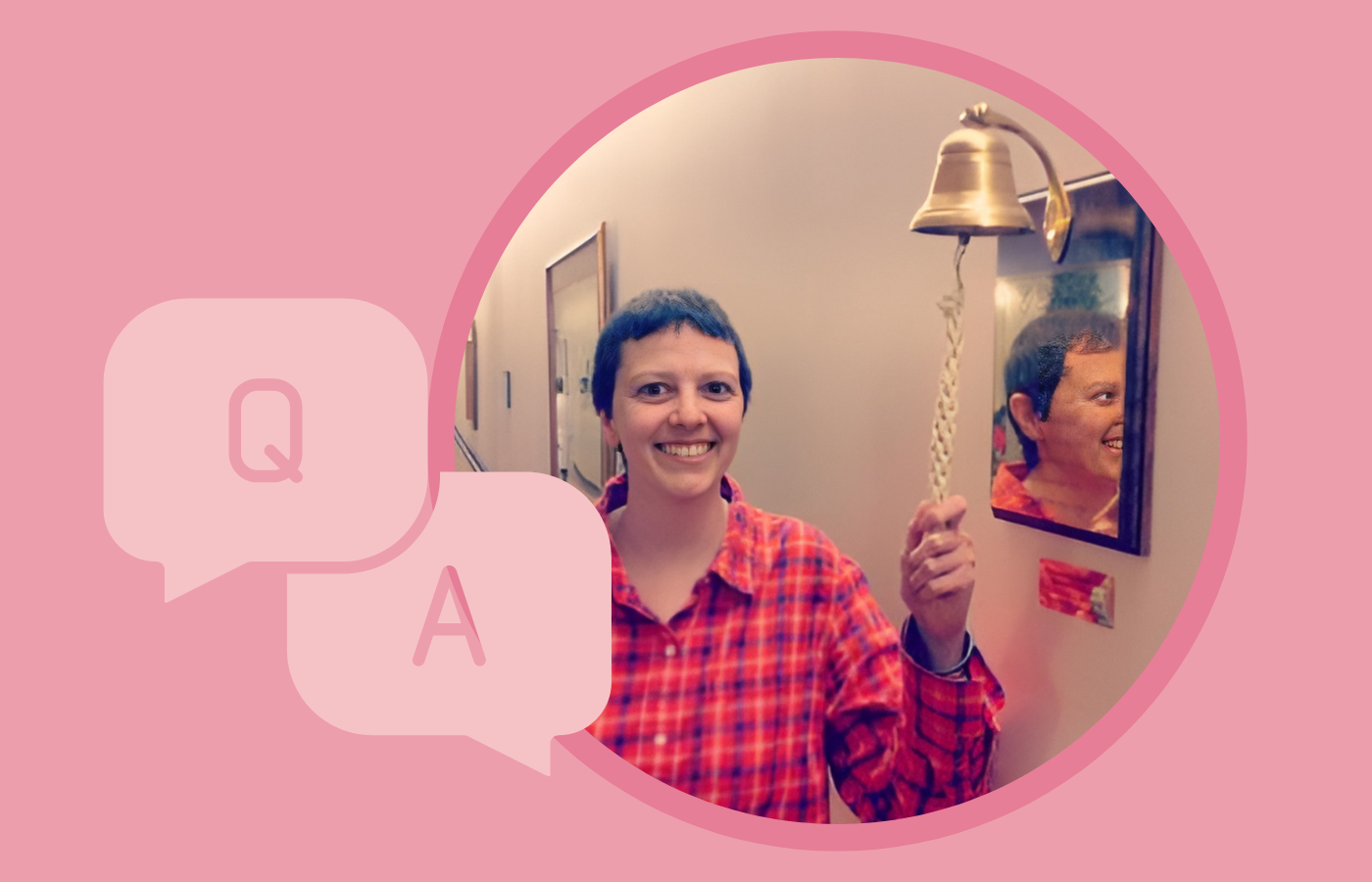On May 3, 2024, Lexie Appleby celebrated her one-year complete remission. At the age of 28, Lexie was newly married, and looking forward to the joys of married life when she noticed the lump on her breast was growing. After this discovery, she knew it was time to see her gynecologist. This visit would change the trajectory of her story and be the catalyst for her advocacy journey.
Read on as Lexie shares her inspirational story, and her tenacious dedication to empowering others by ‘overcoming adversity through sparkle’.
BCRFA: Can you share with us how and when you were first diagnosed with breast cancer? 
Lexie Appleby: In the summer of 2022, I found a lump in my left breast about a month before my wedding in July. Having a history of fibroadenomas, I wrote it off as another benign fibroid and decided to focus on the wedding. After the wedding and honeymoon, in October/November of 2022, I noticed the lump had grown, so I went to my gynecologist. She too thought it felt like a fibroadenoma and referred me to the breast care clinic for an ultrasound and my first mammogram. After a breast biopsy—the third in my life—I felt something was different. On December 1, 2022, I was officially diagnosed with breast cancer.
BCRFA: How old were you when you were diagnosed and what stage of breast cancer did you have?
Lexie Appleby: I was 28 and they considered it stage 1B.
BCRFA: Does your family have a history of breast cancer?
Lexie Appleby: My mom is a breast cancer survivor; however, she had the hereditary testing done and didn’t have the BRCA gene or any other genetic markers that would make it a concern for me to think that it would be passed down from her, let alone at 28. Even as I was going through the process, breast cancer didn’t cross my mind as being a real potential until I had gone in for the mammogram and the biopsy – I could just sense that something was not right.
BCRFA: Did your OBGYN initially order a mammogram or ultrasound?
Lexie Appleby: I had both. They first called me in for an ultrasound, then for a mammogram, and then another ultrasound. What I thought would be a quick appointment turned into a long one, which was my first red flag.
BCRFA: Before you initially went to the doctor had you done self-examinations?
Lexie Appleby: Yes, I think that of all the times I’ve had fibroadenomas, I have caught them all myself. I am thankful that by being diligent and doing self-examinations, I’ve been able to track my baseline and track when something feels different.
BCRFA: After you went to the appointment for your biopsy what happened after that?
Lexie Appleby: I had to wait about a week or so after the biopsy to receive the results. The waiting game was really challenging and when my results came in, I received an email with the full results of my biopsy before receiving a call from my doctor. My doctor had warned me that that was going to be the case and that I was most likely going to get the results in my portal before they would have a chance to call, so they advised that I could look either at it myself or I could wait for someone to call. I knew that I wanted to have an answer right away. When the lab report landed in my inbox, it was all medical jargon, but I could understand enough that it was a positive cancer diagnosis. About thirty minutes from when the report landed in my portal, they called me and confirmed my diagnosis.
BCRFA: How were you feeling when receiving the breast cancer diagnosis?
Lexie Appleby: All of the feelings! It was almost exactly six months to the date of my wedding day, and I was just getting settled into newlywed life. Now I was quickly experiencing ‘in sickness and in health.’ I felt a mixture of sadness, shock, but also peace, because I knew that something wasn’t right, so my diagnosis was confirmation that my intuition was right. That intuition helped me to know that I was preparing for battle rather than being completely off guard since I had already had time to process it.
BCRFA: How did you feel telling your family and your husband of your diagnosis?
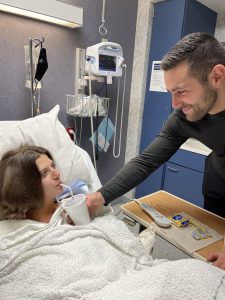
Lexie Appleby: It was really hard. We had already had conversations about what it might look like if the diagnosis was positive. It was right after Thanksgiving, so I had been home with family and talked a lot with my mom. She told me it was probably nothing, but I felt it wasn’t. When I told them, it was confirmation that it was real, but there wasn’t much time for sadness because I had to go to the doctor that afternoon to start figuring out the next steps. It was go time!
BCRFA: What was the treatment you received?
Lexie Appleby: The next steps were to have a mastectomy of my left breast where the cancer was found. My hereditary tests came back negative, so my doctor recommended only a single mastectomy. My doctor explained that breast cancer in my case would not likely hop from one breast to the other, and with my age and no kids, it was recommended to keep one breast for the ability to breastfeed.
BCRFA: How did you feel about taking in all of that information?
Lexie Appleby: Surprised, especially since my mom’s journey was so different. My mom had stage 0 breast cancer at 42 and had a lumpectomy, radiation, and tamoxifen treatment. My story started outlining itself completely differently, with a 15-year difference in our ages at diagnosis.
BCRFA: What else were you experiencing during the time of diagnosis?
Lexie Appleby: At the time of my diagnosis, I was living in Missouri and I had my mastectomy there and then found out during my recovery process that we were moving to Birmingham; so as I am recovering from my surgery, we are also trying to navigate how we are going to be moving across the country and how I am going to get all new doctors. The last thing that I did before I transitioned my doctors from Missouri was I had a port placed (chemotherapy port placement) to prepare myself to have chemo. The doctors that I had talked to had said that looking at my mastectomy results and labs, there was cancer found in one of my lymph nodes. They thought it would be likely that my new doctors in Birmingham would recommend for me to have chemotherapy. Navigating a move, we went ahead and had a port placed before we moved, to be ready for chemo treatments as soon as possible. Then I moved here to Alabama.
BCRFA: How was that moving to Alabama and going through everything?
Lexie Appleby: It was a whirlwind, and I think again I was very at peace with it because I was moving to a world-renowned medical center. If there was anywhere where I knew I would be taken care of, it was going to be in Birmingham. As much of a headache as it was, I was thankful for being on leave at work, so while I was recovering, my days were filled with house hunting, calling doctors, and sending paperwork. My full-time job was transitioning my life. I was distracted by the excitement of what it would be like to be a first-time homeowner. I was also meeting a lot of people in Alabama and everyone I met was so genuine and kind – the Southern hospitality is real!
When we moved here, I got connected through a mutual friend, a survivor, with a doctor based in Nashville who specializes in young women’s breast cancer. She now works hand-in-hand with my oncologist at St. Vincent’s. I only saw her once, but I was at peace knowing I had found someone who truly specialized in young breast cancer. She reiterated what my doctor in Missouri had said: that it was very likely I would need chemo. However, after one final test, they sent my cancer for an Oncotype test. This test scans your cancer against other cancer survivors with very similar cases to determine the treatment effects over the past ten years. The results showed that chemo would not benefit my type of cancer. So, on my birthday, I had my port removed, which was such a blessing.
BCRFA: What’s one thing you wish you knew before starting treatment?
Lexie Appleby: I wish I had known more about what the whirlwind would look like. I had a lot of different opinions at the start of my treatments, and the narrative kept changing, which was hard to navigate.
BCRFA: What was your biggest discovery or revelation after you were diagnosed?
Lexie Appleby: From the moment I was diagnosed, I knew this would change my life. I thought about how I could use my breast cancer diagnosis and journey for the better. How could I turn this story into a more significant purpose that I wouldn’t have had if I weren’t a breast cancer survivor at 30? Now, a year and a half post-diagnosis, I am learning, discovering, and stepping into a new phase of my life that I would never have dreamed of if breast cancer hadn’t been part of my story.
In October of last year, I took a big leap of faith and launched a personal brand on my social media, called “Born to Sparkle.” While it’s not specifically about breast cancer awareness, many parts of my story are woven into it. The brand focuses on overcoming adversity through sparkle, a common theme in my life as a former professional cheerleader, dancer, and pageant participant. I love all things that sparkle, glitter, and are pink, and I’ve been trying to intertwine that theme with how we can each use our own sparkle to overcome challenges. This has been empowering for me, finding ways to use my experiences to help others overcome their biggest challenges.
BCRFA: Did you have to go through fertility appointments?
Lexie Appleby: Within days of closing on our house in Birmingham, I had my egg retrieval. I was flying back and forth between Missouri and Alabama for appointments to stay on track and have my eggs frozen before continuing with radiation. My egg retrieval was done on February 1st, and it was very challenging. I didn’t realize how ill and nauseous I would feel afterward, but ultimately, I am very grateful for going through it. With my hormone therapy, I am currently in menopause at 30. The hope is that after I complete this part of the treatment, which could last between the next five to ten years, my body will ideally bounce back, and my reproductive system will return to normal. It’s reassuring to know that despite everything my body has been through during treatment, I have eggs frozen just in case I need them.
BCRFA: How long was your treatment? 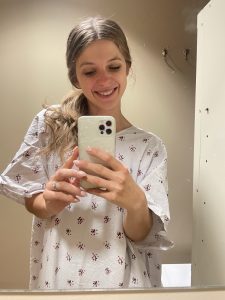
Lexie Appleby: The most rigorous phase leveled off after May 3, the day I rang the bell for complete remission. After finishing radiation in May, I had to wait six months for breast reconstruction in November. My treatment plan was aggressive for about five months, with around seventy-five doctor appointments at that time. After completing radiation, the appointments tapered off.
BCRFA: Did the doctors tell you, you were cancer-free?
Lexie Appleby: It’s funny you ask because it was really anticlimactic! I rang the bell at radiation and then it was like, ‘Well now what?’ I rang the bell, but nobody said, “Congratulations, you’re cancer-free!” A week or two later, my oncologist explained that it was called complete remission and I wouldn’t be considered cancer-free until the five-year mark. I believe in my heart that I am cancer-free, but on paper, it won’t be official until five years without symptoms.
BCRFA: Once you received that you were in complete remission; what was your timeline of seeing your doctors?
Lexie Appleby: I still go to follow-up appointments. I see my oncologist once every three months, have follow-up check-ins, see a dermatologist to check my scars, and do other maintenance visits. It’s nowhere near as significant as it was when I was first diagnosed.
BCRFA: What advice would you give to younger people about early detection and being their own advocate?
Lexie Appleby: Don’t be afraid to advocate for yourself. Trust your intuition and recognize when something feels wrong. I am thankful my doctor listened to me, even though friends and family initially said it was probably nothing. I trusted my gut, and it prepared me for what was to come. My best advice is to avoid panicking if your intuition tells you something is wrong. I have experienced a few occasions where other women who know my story panic, thinking they might face the same battle. Instead, I encourage them to use that feeling as empowerment to take control and advocate for themselves. Wait for the results before self-diagnosing. There is incredible technology, data, and doctors to guide you, especially in the early detection phase, where it could go either way. Don’t immediately panic until you have more information.
BCRFA: What advice would you give to women who have recently been diagnosed with breast cancer?
Lexie Appleby: Lean on your people and your journey in the best way that fits you. Some women find comfort in swapping stories with other survivors. For me, I was very hesitant to talk to other survivors at first because I was taking in so much of my own information that I didn’t want to panic by hearing somebody else’s path. I wanted to hear from my doctors first. Listen and reach out for help when you need it. You are going to get a lot of people who are going to want to offer help, so process how YOU want to be helped, and don’t be afraid to voice that.
BCRFA: How are you today?
Lexie Appleby: I feel amazing! Life is full and busy. It’s a new normal because my journey has completely changed my perspective. I want to live every day to the fullest and I believe that I am really intentional in doing so now. Life is really good!
Thank you, Lexie!
